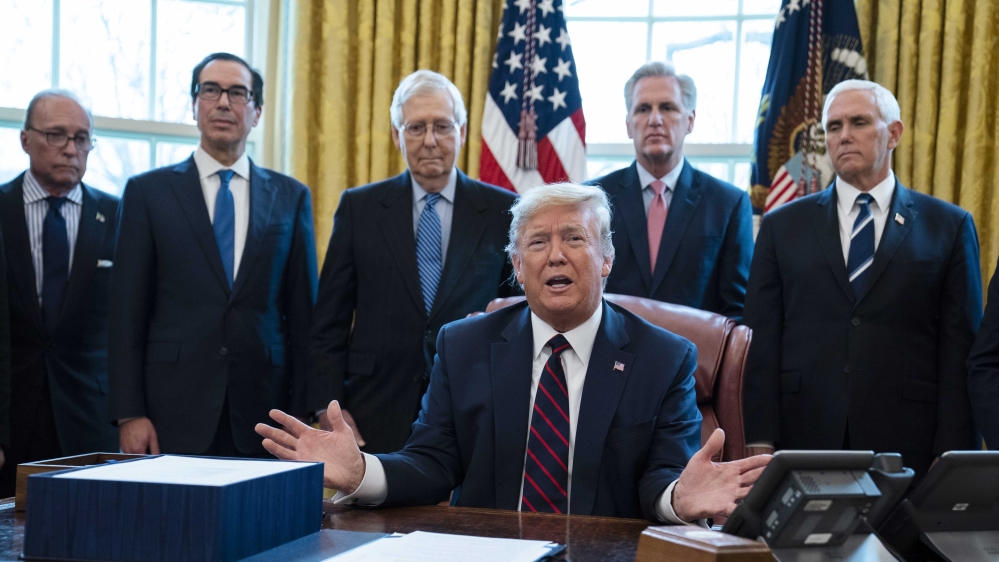This Crisis Has Exposed the Absurdities of Neoliberalism.
How do neoliberal governments act in emergency situations when the interests of the private sector top their agenda?

President Donald Trump talks to reporters before signing the coronavirus stimulus relief package in the Oval Office at the White House, on March 27, 2020. Photo and more
First, Lest We Forget Again!
Neoliberalism: Lessons Learned from a Failed Ideology
Capitalism for the 99% and Socialism for the 1%
Bailout for the Rich and Virus for the Rest of Us
Death and Destruction on Brothers’ Road to Serfdom
Is Neoliberal Economics and Economists 'The Biggest Fraud Ever Perpetrated on the World?'
'The Neoliberal Plague'*
‘For those who aren’t familiar with Albert Camus’ The Plague, disparate lives are brought together during a plague that sweeps through an Algerian city. Today, by way of the emergence of a lethal and highly communicable virus (Coronavirus), we— the people of the West, have an opportunity to reconsider what we mean to one another. The existential lesson is that through dread and angst we can choose to live, with the responsibilities that the choice entails, or just fade away.'

“The Plague” and author Albert Camus. Photo:(Vintage/ Everett/Shutterstock)
For Times of Extremity, Albert Camus Prescribed Modest Virtues
What Albert Camus’s “The Plague” can teach us about life in a pandemic.
'Through the virus, a new light is being shone on four decades of neoliberal reorganization of political economy. The combination of widespread economic marginalization and a lack of paid time off means that sick and highly contagious workers will have little economic choice but to spread the virus. And the insurance company pricing mechanism intended to dissuade people from overusing health care (‘skin in the game’) means that only very sick people will ‘buy’ health care they can’t afford.
Market provision of virus test kits, vaccines and basic sanitary aids will, in the absence of government coercion, follow the monopolist’s model of under-provision at prices that are unaffordable for most people. The most fiscally responsible route, in the sense of assuring that the rich don’t pay taxes, is to let those who can’t afford health care die. If this means that tens of millions of people die unnecessarily, markets are a harsh taskmaster. (3.4% mortality rate @ 2X – 3X the contagion rate of the Spanish Flu @ 4 X 1918 population).
If this last part reads like (Ayn) Randian social theory as interpreted by a budding sociopath in the basement of his dead parent’s crumbling tract home, it is basic neoliberal ideology applied to circumstances that we can see playing out in real time. According to Ryan Grim of The Intercept, Bill Clinton eliminated the ‘reasonable pricing’ requirement for drugs made by companies that receive government funding. This has bearing on both commercially developed Coronavirus test kits and vaccines.
The Damning Impact of a Toxic Philosophy on America: The Tragedy of Ayn Rand
Leaving aside technical difficulties that either will or won’t be resolved, how would any substantial portion of the 80% of the population that lives hand-to-mouth be effectively quarantined when losing an income creates a cascade effect of evictions, foreclosures, starvation, repossessions, shut-off utilities, etc.? The current system conceived and organized to make desperate and near desperate workers labor with the minimum of pay and benefits is a public health disaster by design.
While the American response to the Coronavirus threat seems to be less than robust, there was a near instantaneous response from the Federal Reserve to a 10% decline in stock prices. The same Federal Reserve that has been engineering a non-stop rise in stock prices since Wall Street was bailed out in 2009 knows perfectly well how narrowly stock ownership is concentrated amongst the rich— it publishes the data. It quickly lowered the cost of financial speculation as the cost of Coronavirus tests and a vaccine— and the question of who will bear them, remain indeterminate.
If priorities seem misplaced, you haven’t been paying attention. The statistics on suicides, divorces, drug addiction and self-destructive behavior that result from the loss of employment were understood and widely published by the early 1990s, at the peak of that era’s round of mass layoffs. Creating employment insecurity was the entire point of neoliberal reforms such as outsourcing, de-skilling and contingent employment. Neoliberal theory had it that desperate workers work both longer and harder. And they die younger.
The Broken Economic Model and the Inhumanity of the Lost Decade of Austerity
People’s Tragedy: Neoliberal Legacy of Thatcher and Reagan
Neoliberalism and the rise in global loneliness, depression and suicide
The brutality of the logic used by the Obama administration in constructing the ACA, Obamacare, is worthy of exploration. The premise behind the ‘skin in the game’ idea is neoliberalism 101, developed by a founder of neoliberalism, economist Milton Friedman, to ration health care. The basic idea is that without a price attached to it, people will ‘demand’ more health care than they need. That from a public health perspective, oversupplying health care is better than undersupplying it, is ignored under the premise that public health concerns are communistic. (Read Friedman).
The Destruction of our World and the lies of Milton Friedman
Economic Growth: The Index of Misery
But how likely is it that people will ‘demand’ too much healthcare? The starting position of Obamacare was that the American healthcare system provided half the benefit at twice the price of comparable systems. Through the ‘market’ pricing mechanism that existed, the incentive was for people to avoid purchasing healthcare because it was / is wildly overpriced. Not considered was that through geographical and specialist ‘natural monopolies,’ health care providers had an incentive to undersupply health care by providing high-margin services to the rich.
Furthermore, why would a healthcare system be considered from the perspective of individual users? In contrast to the temporal sleight-of-hand where Obamacare ‘customers’ are expected to anticipate their illnesses and buy insurance plans that cover them, the entire premise of health insurance is that illnesses are unpredictable. Isn’t the Coronavirus evidence of this unpredictable nature? And through the nature of pandemics, it is known that some people will get sick and other people won’t. Not known is precisely who will get sick and who won’t.
While there are public health emergency provisions in Obamacare that may or may not be invoked, why does it make sense in any case to require that people anticipate future illnesses? Such a program isn’t health care and it isn’t even health insurance. It is gambling. Guess right and you live. Guess wrong and you die. Why should we be guessing at all? Prior to Obamacare, health insurance companies gamed the system with life and death decisions. In true neoliberal fashion, Obamacare randomized the process as health insurers continue to game the system.
As I understand it, the public health emergency provision in Obamacare might cover virus testing and the cost of a vaccine if one is ever found. Great. What about care? How many readers chose a plan that covers Coronavirus? How many days can you go without a paycheck if you get sick or are quarantined? Who will take care of your children and for how long? How will you pay your rent or mortgage? Who will deliver groceries to your house and how will you pay for them? How will you make the car payment before they repossess it and how will you get to work without it if you recover?
The rank idiocy— and the political content, of the frame of individual ‘consumers’ overusing health care quickly devolves to the fact that some large portion of the American people can’t afford to go to the doctor when they need to. Even if they can afford the direct costs, they can’t afford the indirect costs. When Obamacare was passed, the U.S. had the worst health care outcomes among rich countries. Ten years later, the U.S. has the worst healthcare outcomes among rich countries. And medical bankruptcies are virtually unchanged since Obamacare was passed.
The reason for focusing on Obamacare is it is the system through which we encounter the Coronavirus. In the narrow political sense of getting a health care bill passed, Obamacare may or may not have been ‘pragmatic.’ In a public health care sense, it is a disaster decades in the making. The problem wasn’t / isn’t Mr. Obama per se. It is the radical ideology behind it that was posed as pragmatism. Mr. Obama’s success was to get a bill passed— a political accomplishment. It wasn’t to create a functioning healthcare system.
The otherworldly nature of neoliberal theory has led to a most brutal of social philosophies. Mr. Obama later put his energy into lengthening drug company patents to give drug companies an economic advantage provided by the government. Economist Dean Baker has made a career out of hammering this general point home. Michael Bloomberg benefited from government support for both technology and finance. His fortune of $16 billion in 2009 followed stock prices higher to land him at $64.2 billion in 2020.
Donald Trump inherited a large fortune that likewise followed stock and Manhattan real estate prices higher. Both he and Mr. Bloomberg could have put their early fortunes into passive portfolios and received the returns that they claim to be the product of superior intelligence and hard work. Analytically, if the variability of these fortunes tracks systemic, rather than personal, factors, then systemic factors explain them. The same is true of most of the great fortunes of the epoch of finance capitalism that began around 1978.
The point of merging these issues is that they represent flip sides of the neoliberal coin. In a broad sense, neoliberalism is premised on economic Darwinism, the quasi-religious (it isn’t Darwin) idea that people land where they deserve to land in the social order. This same idea, that systemic differences in economic outcomes are evidence of systemic causes, applies here. However, differences in intelligence, initiative and talent don’t map to systemic outcomes, meaning that concentrated wealth isn’t a reward for these.
The ignorant brutality of this system appears to be on its way to getting a reality check through a tiny virus. Unless the Federal government figures this out really fast, most of the bodies will be carried out of poor and working class neighborhoods like mine. Few here have health insurance and most health care providers in the area don’t take the insurance they do have. More than a day away from work and many of my neighbors will no longer have jobs. Evictions are a regular state of affairs in good times. There are no resources to facilitate a larger-picture response.
Liberalism, of which neoliberalism is a cranky cousin, lives through a patina of pragmatism until the nukes start flying or a virus hits. Getting healthcare ‘consumers’ to consider their market choices follows a narrow logic up to the point where none of the choices are relevant to a public health emergency. One I plus another I plus another I doesn’t equal us. The fundamental premise of neoliberalism, the Robinsonade I, has always been a cynical dodge to let rich people keep their loot.
The mortality rate and contagion factor recently reported for Coronavirus (links at top) place it above the modern benchmark of the Spanish Flu of 1918 in terms of potential lethality. What should make people angry is how the reconfiguration of political economy intended to make a few people really rich has put the rest of us at increased risk. These are real people’s lives and they matter.
Finally, for students of neoliberalism: there is no conflation of neoliberalism with neoclassical economics here. Milton Friedman, one of the founders of neoliberalism through the Mont Pelerin Society, produced a long career’s worth of half-baked garbage economics. On the rare occasions when he wasn’t helping Chilean fascists toss students out of airplanes in flight, he was pawning his infantile theories off on future Chamber of Commerce and ALEC predators. His positivism was already known to be a farce when he took it up. Here is a primer that explains why it is, and always will be, a farce.’
*The above piece by Rob Urie was first published in CounterPunch on 6 March 2020.
Read more articles by Rob Urie
‘When all of this is over, the world won’t be the same.’
But, the Challenge Is: How to Make the World a Better Place?
I am sure there are many answers to this timely question. Below are my offerings:
My Six Steps to a Better World and a Better Life
Neoliberalism's excesses belong in the dustbin of history. What's next is up to us
We, the people, all around the globe, are slowly realising that our planet, our lives, and more are in desperate need for new measures to evolve humanly, environmentally, economically and politically towards a more cooperative, peaceful and respectful sense of interdependency.
While the urgency is being felt on all levels, too many feel disempowered with the potential to spark a change, make a difference or even perceive an ounce of hope for the future.
The task isn’t small. Indeed, the task is so great that there is only one way to succeed, and that is, all of us, coming together in the spirit of the common good, to empower and enable each one of us to become self-directed, and active in defining this time in the world as opportunity for positive change and healing and for the true formation of a culture of peace by giving thanks, spreading joy, sharing love, seeing miracles, discovering goodness, embracing kindness, practicing patience, teaching tolerance, encouraging laughter, celebrating diversity, showing compassion, turning from hatred, practicing forgiveness, peacefully resolving conflicts, communicating non-violently, choosing happiness and enjoying life. Carpe Diem!

Photo:modernlifeblogs.com
1- Throw away this single-minded ideology and replace it with a more balanced logic, laying the foundations for a better, more equitable world
Death and Destruction on Brothers’ Road to Serfdom
Neoliberalism destroys human potential and devastates values-led education
2- Replace the selfishness and hatred of neoliberalism with Kindness
Kindness to Heal the World- Kindness to Make the World Great Again
“In a world where you can be anything, be kind.”
3- Replace the hopelessness of neoliberalism with Hopefulness
Crisis after crisis and the crucial voices of hope
How to defeat hatred and fear: Don't Despair Walk On
4- Replace the delusional and destructive neoliberal education with inspirational values-led Education
The Value of Values: Values-led Education to Make the World Great Again
Brexit, Trump and the failure of our universities to pursue wisdom Details
To All Striking Academic Colleagues in Britain: Turn the Strike to a Force for the Common Good
The Journey to Sophia: Education for Wisdom
5- Replace the devastated neoliberal economy with Economy as if People Mattered
Is Neoliberal Economics and Economists 'The Biggest Fraud Ever Perpetrated on the World?'
My Economics and Business Educators’ Oath: My Promise to My Students
What might an Economy for the Common Good look like?
6- and finally, throw away the fake neoliberal ‘teachers’ and let nature to be our wisest Teacher
On the 250th Birthday of William Wordsworth Let Nature be our Wisest Teacher
Why should we all become mother nature and sacred earth guardians
To Heal the World and People We Need to Save the Commons from Plunder
